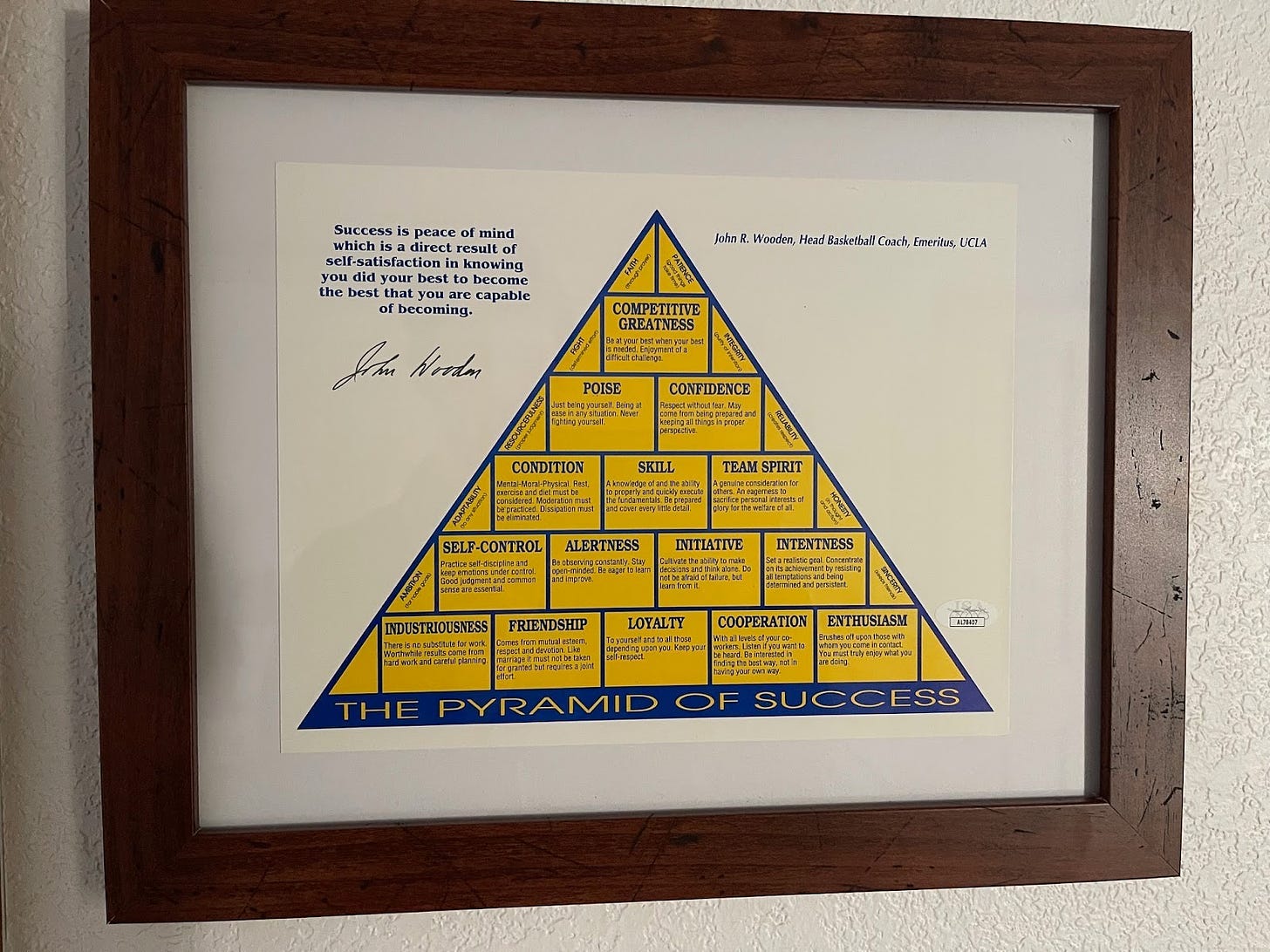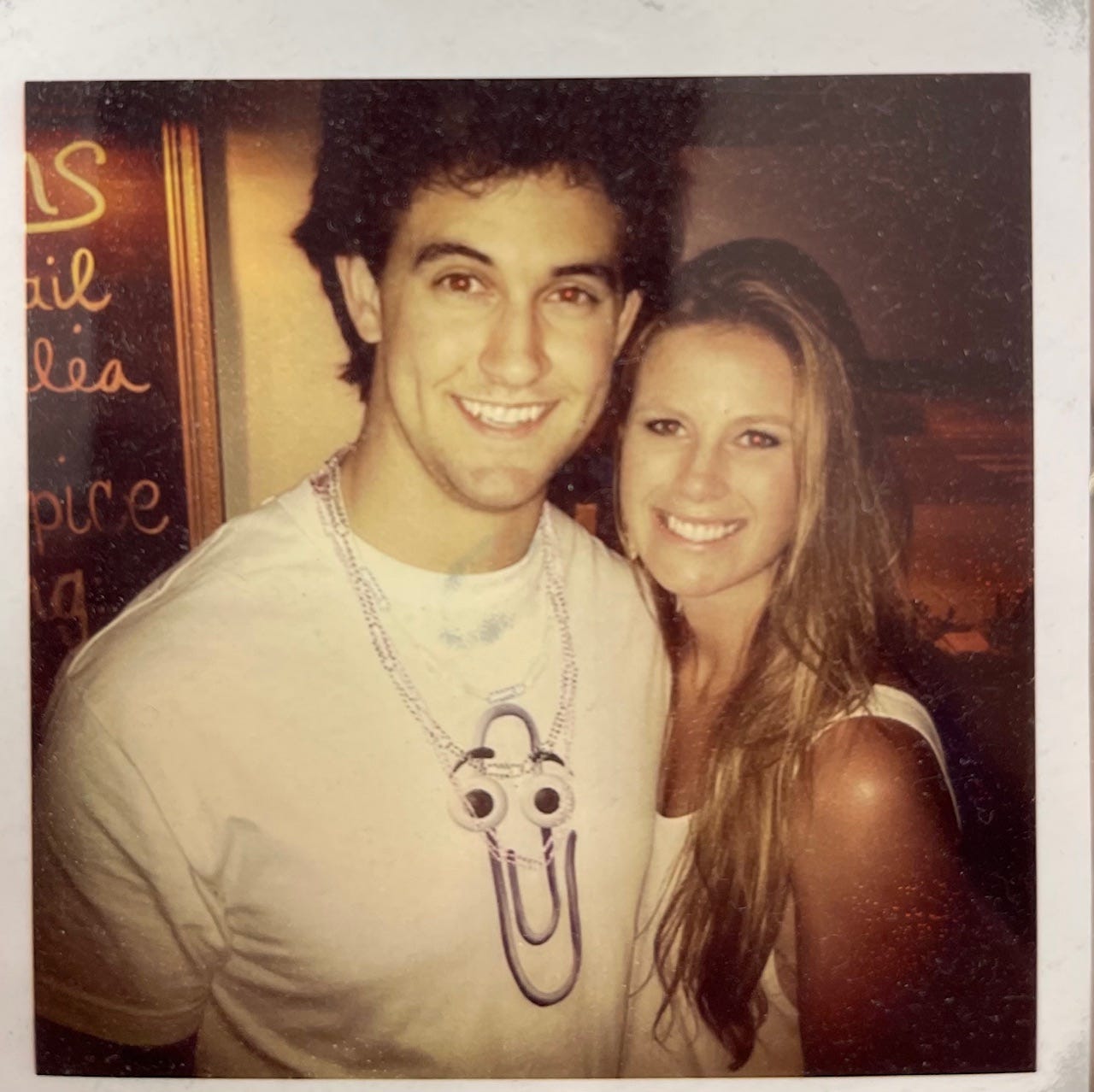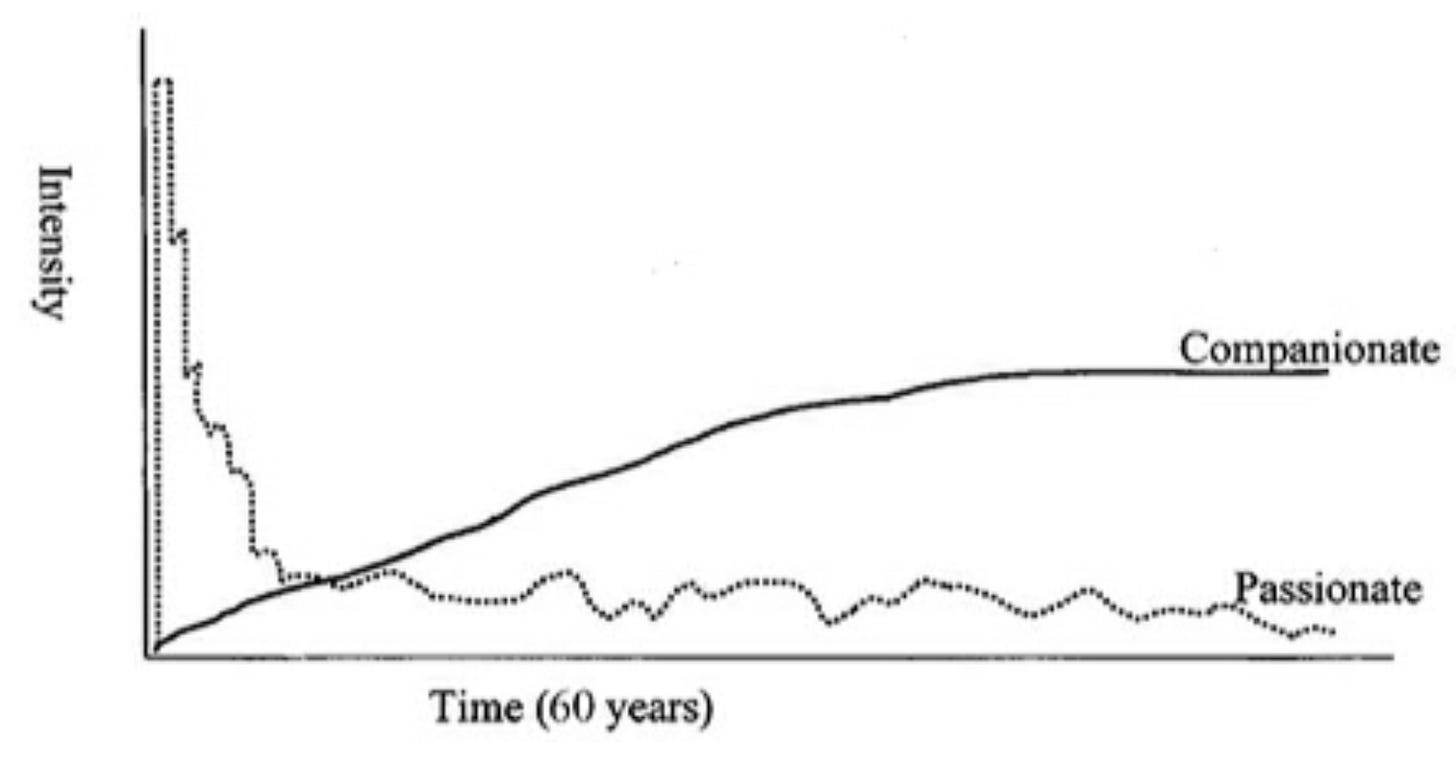Obligatory Dad Joke:
Sometimes I wake up grumpy.
… But other times I let her sleep in.
Disclaimer: This may come as a shock, but I am no love expert. Rather, I write this post as a best effort to codify what I believe my wife, best friend, and mother of my children truly deserves.
Two 6-footers form a common bond
My wife and my meet-cute is a tale as old as time:
Boy goes to a Santa pub crawl and stands in line for a bar.
Boy looks behind him and spots a rather tall reindeer among a herd.1
Reindeer forgets her ID and can’t actually go into the bar + boy never gets her number.
Boy and reindeer reconnect on LinkedIn.
Boy and reindeer (we can call her Natalie at this point) get married and have two girls.
(it’s so played out… the story almost writes itself)
Beyond bonding over our vertical proclivities, Natalie and I discovered a mutual adoration for John Wooden. I went to Bruin Woods as a kid idolizing John Wooden. Natalie went to UCLA and has John Wooden on her Mt. Rushmore of heroes.2 A match made in Bruin heaven.
Just this past Christmas, I even got Natalie a signed Pyramid of Success poster (I know, I know… I'm a great husband, but that’s not the point of the story...).3
From DINK to DITCH
Apart from basking in the glow of our mutual JW admiration, the early days of dating and marriage were magic. This, my dear readers, is what society often refers to as the “DINK” phase (Double Income, No Kids).
Want to go wine tasting? – No problem.
Tired and want to sleep in? – Yes please.
A new brunch spot that has a 2-hour wait? – Umm, obviously.
Dress up for a 90’s power hour? – You read my mind.
Alas, times change.
Natalie and I are no longer in the DINK phase of life – now we live in the DITCH era (Double Income, Two CHildren.. Catchy huh? 🙂)
Want to clean out a poop covered car seat? – Wasn’t top of my list.
How about some spontaneous emotional combustion? – Sure. When it’s not Emmie or Charlie, I will fill that role.
Tired and want to sleep in? – If you string enough naps together, does that count?
Yet in the midst of this glorious chaos, I've come to realize just how subtly my perception of Natalie has shifted from beloved partner 👩❤️👨 to fellow soldier in the trenches of parenthood 🫡. Dates, romance, trips… all have taken a backseat as we dedicate what limited time, money, and energy we have to or children.
Is this just the way things are now? Don’t get me wrong: we love our children. But are kids ALWAYS to come first??
Reflecting on our new reality, I found myself seeking wisdom from our shared idol and asking myself:
What Would John Do?
Love your wife
"A best thing that a father can do for his children is to love their mother." - John Wooden
John Wooden is the greatest coach of all time.4 Yet, amidst the whirlwind of his demanding career and the spotlight that followed him, Wooden's most remarkable feat may have been his unwavering commitment to his wife, Nellie, and their life together.
Ahead of each match in his storied career, Wooden would gesture to Nell through a wink, nod, smile, or a kiss sent through the air. She would reciprocate with a circle made from her thumb and index finger. They were sympatico from the opening tipoff to the final buzzer.
After the coaching whistle blew, John never ceased to make time and effort for Nellie. Date nights at home were sacred — usually involving a friendly match of Scrabble (their favorite pastime) or enjoying their cherished tunes. Regardless of the activity, John guarded these moments with Nell as fiercely as Lew Alcindor protected the basket.
One of the most touching expressions of Wooden's love was the tradition of writing love letters to Nellie on the 21st of every month, marking their anniversary. This practice, which he continued even after her passing in 1985 until his own death in 2010, was a testament to his undying love. Each letter, tied with a yellow ribbon and placed near her photograph, served as a bridge across the chasm of loss, keeping the memory of their shared life vibrant and alive.
Through this unwavering commitment to each other, John and Nell managed to raise two wonderful children, Jim and Nan, both of whom went on to become grandparents and lead long and fulfilling lives.
There is little doubt - Wooden was not just a legendary coach but a paragon of love and dedication. But is loving your wife REALLY the best thing you can do for kids? It is a very sweet notion and one that I wish with every fiber of my being is correct, but the math nerd in me does have to inquire…
What do the data suggest?
Loving your spouse is good for your children
When it comes down to it, what do we ultimately want for our kids? If you ask most parents, the answer is 1) Happiness and 2) Success.
In both of these instances, the bond that mom and dad forge can make a impact.
Happiness
As a General Manager at Rula, I have a front row seat to the mental health epidemic in this country. Depression and suicide rates are at an all-time high, with the sharpest rises among adolescents and teens.
If there is a silver lining in any of this, it is that we parents DO have an active role we can play —
Over 1000 studies have explored how parenting styles impact children's mental health, including issues like anxiety, depression, aggression, and delinquency. The findings are unequivocal:
Authoritative parenting (i.e., unconditional love + firmly enforced boundaries) leads to lower instances of mental health issues and delinquent behavior, both immediately and in the long run.
In contrast, both authoritarian (i.e., heavy-handed) and overly permissive parenting are linked to a higher risk of mental health problems and problematic behaviors.
Interesting and encouraging data — but how does that relate to loving your wife?
Here’s how:
Parents in loving relationships are significantly more likely to adopt parenting best practices (i.e., authoritative parenting). Several factors contribute to this, most notably parents shared sense of security in each other, reducing the desire to make their child a ‘friend’ and thus avoiding overly permissive behavior.
Success
Children of openly loving parents not only reap mental health benefits, but also are more likely to excel in their studies and forge healthier personal relationships.
Seeing how parents navigate conflict provides children with invaluable lessons in healthy relationship practices, emotional stability, conflict resolution, and mutual respect. (And from my previous post, we saw that conscientiousness is more indicative of academic success than IQ)
As James Baldwin remarked:
“Children have never been very good at listening to their elders, but they have never failed to imitate them.”
Children’s take on relationships and conscientiousness is no exception.
Loving your spouse is good for YOU
Parenting isn't just about self-sacrifice for our families; we are individuals in pursuit of happiness and love too. And social media relentlessly bombards us with streams of envy-inducing merrymaking & tomfoolery that our single friends partake in.
Thankfully, for those of us who are married, we can find the very fulfillment we so desire in our life partners. Although raw "happiness" metrics might not differ significantly between married and single individuals, married folks are more likely to consider themselves thriving — that is, having both good current wellbeing AND positive anticipated wellbeing — compared to their single counterparts.
Beyond intramarital fulfillment, a strong marriage also predicts the relationship you have with your children. In fact, parent-partner relationship quality is the single strongest predictor of child-parent relationship quality.
Tl;dr - loving your spouse can help you find fulfillment and fortify your parent-child bond.5
Beyond the butterflies - the magic of companionate love
“One can live magnificently in this world, if one knows how to work and how to love, to work for the person one loves and to love one’s work.” - Leo Tolstoy
In an era where instant gratification and fleeting passions dominate our cultural milieu, Tolstoy’s wisdom offers a beacon of truth: it is up to US to labor for the love that we so desire (vs. waiting for love to come to us).
For nearly everyone (particularly parents) the raw intensity and joy found in romantic love naturally diminish over time. The sensations we feel at the start of a romance are distinct, influenced not only by our emotions but also by physiological changes. During this initial stage, our brains produce and release hormones such as dopamine, norepinephrine, and oxytocin, leading to a euphoric state that enhances feelings of happiness, energy, and connection with our partner.
However, like all euphoric states, this hormonal high eventually fades. Many a married couple finds that the initial flutter of "butterflies" in the stomach wanes, resurfacing only sporadically.
As psychologist Jonathan Haidt notes,
“If passionate love is a drug — quite literally — it’s bound to dissipate over time.”
Consequently, some couples mistakenly believe that the disappearance of this initial enchantment means their love wasn't genuine.
But the cessation of this chemical high does not spell the end of love; rather, it marks the beginning of a more profound, enduring connection. While passionate love might be likened to a blazing fire, companionate love is better represented by vines that grow, intertwine, and steadily draw two people closer, creating a lasting union.6
True love, the foundation of enduring marriages, is essentially a robust form of companionate love, enriched with a measure of passion, shared by two individuals deeply committed to each other. In direct comparison, companionate love may seem less intense than passionate love because it doesn't reach the same intensity.
Yet, if we extend our time horizon, passionate love appears fleeting — an ephemeral spark — whereas companionate love endures for a lifetime. It's this enduring, companionate love, often observed in couples celebrating their golden anniversaries, that truly captivates us.
Putting in the work
To quote a recent piece in WSJ:
The paradox of contemporary marital happiness is that husbands and wives who don’t focus on being in love but instead recognize that love is a decision to care for their spouse… are more likely to find themselves happily married.
Case in point — Couples engaging in regular date nights are approximately 15% more likely to report high levels of happiness in their marriage and 20% more likely to express greater sexual satisfaction than those who rarely or never prioritize such outings. Just as John and Nell did — carving out time, investing in romance, and actively nurturing the marital bond gives us the best chance at marital fulfillment.
Personally, I have a long ways to go here. But in the spirit of taking moments to show and practice love amidst the mayhem, I now latch onto Natalie with 6-second hugs (even betwixt her eye rolls) every chance I can muster. For the nerds among us, this is apparently is the minimum time required for oxytocin and seratonin release.7 🤗
In that vein, my penultimate parting note is for Natalie:
I cherish you and thank God everyday that he brought you into my life… and I’ll try to stop leaving a trail of Spindrifts in my wake as I meander throughout the house.
And finally, I will end this piece it where we began — in the capable hands of Mr. John Wooden.
“Passion is temporary. Love is enduring.” - John Wooden

Shout out to Chels and Phil for greasing the wheels of that intro.
Up there with Coach Herman Boone (Remember the Titans) and Lieutenant Dick Winters (Band of Brothers).
Conveniently burying my less-than-stellar gifts in the footnotes — like the time I DoorDash’d gas station candy for Valentine's Day…
with no card…
in a brown paper bag…
with the DoorDash receipt inside…
for Natalie to open on her own…
Pro move right there, kids.
Fisticuffs await whomever has the audacity to dissent.
For the elephant in the room
Important disclaimer — Being unmarried does NOT preclude your child from achieving success nor inhibit the development of an incredible parent-child relationship. The data mentioned heretofore predominantly show correlations, not causation.
“Don’t touch this topic with a 10-foot pole.” - Natalie
It’s ironic that in a post championing the importance of loving and respecting one's wife, I'm sidestepping my own wife’s words of wisdom. Alas, I feel the need to address the elephant in the room (albeit in the footnotes).
🐘 50% of marriages end in divorce.
Unfortunately, “til death do us part” doesn’t always work out that way. Irreconcilable differences happen. Separations happen. Divorces happen. Life is life. But there is one lesson that comes up time and again from research:
👉 Don't speak ill of the mother / father.
Straight from the Cleveland Clinic
“It is not harmful for parents to admit that they do not get along. It is not harmful for parents to admit to having different rules and/or priorities. But it is extremely harmful to children when their parents are judgmental of each other and create a belief that one [parent] is good, and the other is bad.” - Catherine Gaw, PsyD, pediatric psychologist at Cleveland Clinic Children’s Hospital (link)
Children hold deep affection for both parents; negative comments about one from the other can create internal emotional turmoil. Kids often view their parents as extensions of themselves, making criticism from one parent feel like a personal attack. Additionally, this behavior can foster trust issues, leaving children confused about what they can safely share, and potentially pushing them away.
Moreover, research has shown that divorced couples who 1) maintain mutual respect and 2) equally share custody often have children whose physical, psychological, and social wellbeing mirror those of children raised in two-parent households.
Thank you Jonathan Haidt for that analogy… I’m an big John Haidt fanboy, if you can’t tell.
From Gretchen Rubin’s the Happiness Project:
”We hugged — for at least six seconds, which, I happened to know from my research, is the minimum time necessary to promote the flow of oxytocin and serotonin, mood-boosting chemicals that promote bonding.”











Thanks for the hat tip! We had wonderful role models ourselves.
*Scheduling more 6 second hugs throughout the day*